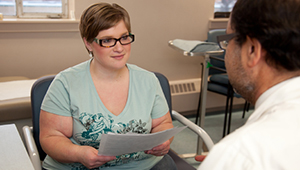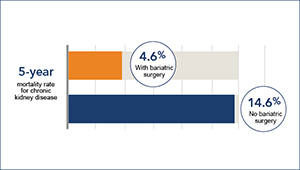Obesity
Research overview
“Obesity is the number-one health problem in the United States because it negatively affects our population’s health more than any other condition,” said Kaiser Permanente Washington Health Research Institute Senior Investigator David Arterburn, MD, MPH. Kaiser Permanente Washington researchers are doing practical research to learn how doctors, patients, families, employers, and policymakers can best work together to prevent and treat obesity.
“We’re focusing on three ways to halt the obesity epidemic,” said Senior Investigator Dori Rosenberg, PhD, MPH. “We’re helping to change obesity-promoting environments, bringing evidence-based prevention and treatment programs into health care systems, and helping people develop lifelong healthy diet and activity habits.”
Kaiser Permanente Washington obesity research areas include:
- reducing sedentary behavior and promoting physical activity and healthy diet in various age groups, populations with chronic conditions, and families;
- shared decision making to help patients find the best way to a healthy weight;
- implementing health coaches in primary care to support behavior changes;
- social networks that support lifestyle change programs;
- relationships between medications and genetic factors in developing obesity;
- health system, community, and national policies that address obesity;
- relationships between obesity and depression, diabetes, and other conditions; and
- long-term benefits and risks of bariatric (weight loss) surgery.
“Obesity is caused by many factors, so at Kaiser Permanente Washington, we’re working on many levels,” said Paula Lozano, MD, MPH, a senior investigator and Kaiser Permanente Washington’s assistant medical director for preventive care. “We’re improving health care to help people who are obese now. But since obesity is a societal problem, we’re also studying how to change our homes and workplaces and neighborhoods to create more healthy environments.”
Recent publications on Obesity
Fisher DP, Liu L, Arterburn D, Coleman KJ, Courcoulas A, Haneuse S, Johnson E, Li RA, Theis MK, Taylor B, Fischer H, Cooper J, Herrinton LJ Remission and Relapse of Hypertension After Bariatric Surgery: A Retrospective Study on Long-Term Outcomes 2022 Jun;3(2):e158. doi: 10.1097/AS9.0000000000000158. Epub 2022-04-27. PubMed
Basu A, Barton LJ, Fischer H, Reynolds K, Arterburn DE, Barthold D, Courcoulas A, Crawford CL, Fedorka PN, Kim BB, Mun EC, Murali SB, Zane RE, Coleman KJ Comparative effectiveness of gastric bypass and sleeve gastrectomy on predicted 10-year risk of cardiovascular disease 5 years after surgery 2022 Jun;18(6):716-726. doi: 10.1016/j.soard.2022.02.021. Epub 2022-03-09. PubMed
Coleman KJ, Paz SR, Bhakta BB, Taylor B, Liu J, Yoon TK, Macias M, Arterburn DE, Crawford CL, Drewnowksi A, Figueroa Gray MS, Hansell LD, Ji M, Lewis KH, Moore DD, Murali SB, Young DR Cohort profile: The Bariatric Experience Long Term (BELONG): a long-term prospective study to understand the psychosocial, environmental, health and behavioural predictors of weight loss and regain in patients who have bariatric surgery 2022 May 24;12(5):e059611. doi: 10.1136/bmjopen-2021-059611. Epub 2022-05-24. PubMed
Lewis KH, Argetsinger S, Arterburn DE, Clemenzi J, Zhang F, Kamusiime R, Fernandez A, Ross-Degnan D, Wharam JF Comparison of Ambulatory Health Care Costs and Use Associated With Roux-en-Y Gastric Bypass vs Sleeve Gastrectomy 2022 May 2;5(5):e229661. doi: 10.1001/jamanetworkopen.2022.9661. Epub 2022-05-02. PubMed
Chhabra KR, Telem DA, Chao GF, Arterburn DE, Yang J, Thumma JR, Ryan AM, Blumenthal B, Dimick JB Comparative Safety of Sleeve Gastrectomy and Gastric Bypass: An Instrumental Variables Approach 2022 Mar;275(3):539-545. doi: 10.1097/SLA.0000000000004297. Epub 2020-11-12. PubMed
Researchers in Obesity
 David E. Arterburn, MD, MPHSenior Investigator |
 Allen Cheadle, PhDSenior Investigator, KPWHRI; Senior Research Associate, CCHE |
 Andrea J. Cook, PhDSenior Biostatistics Investigator |
 Maricela Cruz, PhDAssociate Biostatistics Investigator |
 Nicole M. Gatto, PhD, MPHPrincipal Collaborative Scientist |
 Beverly B. Green, MD, MPHSenior Investigator |
 Mikael Anne Greenwood-Hickman, MPHSenior Collaborative Scientist |
 Paula Lozano, MD, MPHSenior Investigator; Director, ACT Center |
 Dori E. Rosenberg, PhD, MPHSenior Investigator |
 Gregory E. Simon, MD, MPHSenior Investigator |











